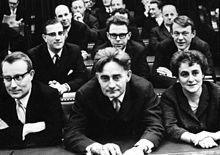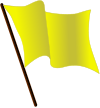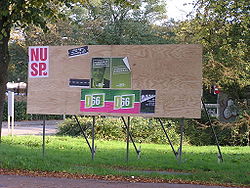- Democrats 66
-
Democrats 66
Democraten 66
Leader Alexander Pechtold Party Chairperson Ingrid van Engelshoven Leader in the Senate Roger van Boxtel Leader in the House of Representatives Alexander Pechtold Leader in the European Parliament Sophie in 't Veld Founded 14 October 1966 Headquarters Partijbureau D66
Hoge Nieuwstraat 30
Den HaagYouth wing Young Democrats Ideology Social liberalism[1] Political position Centre[2] International affiliation Liberal International European affiliation European Liberal Democrat and Reform Party European Parliament Group Alliance of Liberals and Democrats for Europe Official colours Green Seats in the House of Representatives 10 / 150Seats in the Senate 5 / 75Seats in the European Parliament 3 / 25Website www.d66.nl Politics of Netherlands
Political parties
ElectionsDemocrats 66 (Dutch: Democraten 66, D66; official name: Politieke Partij Democraten 66) is a progressive[3] and social-liberal[1] political party in the Netherlands. D66 was formed in 1966 by a group of politically unaligned, young intellectuals, led by journalist Hans van Mierlo. The party's main objective was to democratise the political system; it proposed to create an American style presidential system. In the 1967 general election, the party won 7 of the 150 seats in the House of Representatives, no new party had ever gained that many seats before. The electoral history of the party is characterised by large fluctuations. At one point they had 24 seats, currently (following the June 2010 Parliamentary elections) they have 10. The party was in government from 1973-1977, 1981-1982, 1994-2002 and 2003-2006. Over time the party began to emphasise other issues in addition to democratic reform, creating a social-liberal programme.
Currently the party is represented by ten seats in the House of Representatives, five in the Senate and three in the European Parliament. The party leader, and chair of the parliamentary party in the House of Representatives, is Alexander Pechtold. The party is in opposition against the Rutte cabinet. The party has a small number of elected local and provincial politicians, but supplies a relative large share of the mayors, which are appointed. The party's voters are concentrated in larger cities, especially those with a university.
The organisation of D66 is based on principles of direct democracy[citation needed]. Important decisions are made per referendum. D66 is a member of the Liberal International, the European Liberal Democrat and Reform Party and the Alliance of Liberals and Democrats for Europe.
Contents
History
Foundation
D66 was founded on 14 October 1966 by 44 people. Its founders were described as homines novi, although 25 of the 44 had previously been members of a political party. The initiators were Hans van Mierlo, a journalist for the Algemeen Handelsblad and Hans Gruijters, a municipal councillor in Amsterdam. Van Mierlo became the party's political leader and Gruijters the party's chair. The foundation of the party was preceded by the Appeal 1966 on October 10, in which the founders appealed to the people of the Netherlands to re-take their democratic institutions. The party renounced the 19th century political ideologies, which dominated the political system and wanted to end pillarisation. It called for radical democratisation of the Dutch society and its political system and it called for pragmatic and scientific policy-making.
1967-1986
Netherlands 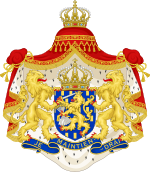
This article is part of the series:
Politics and government of
the NetherlandsConstitutionCabinetDecentralized gov'tForeign policyRelated subjects
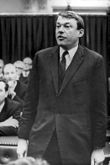
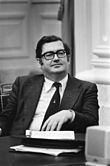 Party founders Hans van Mierlo (left) and Hans Gruijters (right)
Party founders Hans van Mierlo (left) and Hans Gruijters (right)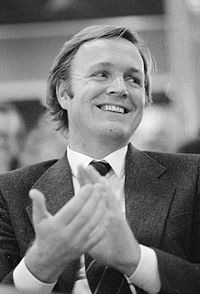 Jan Terlouw, party leader from 1973 until 1981.
Jan Terlouw, party leader from 1973 until 1981.
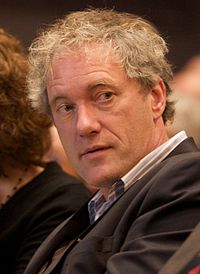 Thom de Graaf, party leader from 1998 until 2003.
Thom de Graaf, party leader from 1998 until 2003.
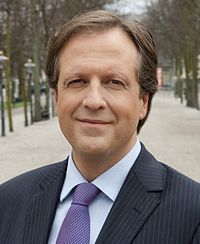 Alexander Pechtold, current party leader since 2006.
Alexander Pechtold, current party leader since 2006.
The party entered in the 1967 general election with Hans van Mierlo as their top candidate. The party won an unprecedented seven seats in parliament. In the 1971 general election the party won an additional four seats and it formed a Shadow Cabinet with the Labour Party (PvdA) and the Christian left Political Party of Radicals (PPR). In the 1972 general election, the three parties formed a political alliance called the "Progressive Accord" (Dutch: Progressief Akkoord; PAK) and presented a common electoral program (Keerpunt '72; turning point '72). In the elections D66 lost nearly half its seats, leaving only six. The alliance became the largest political force in the country, but it did not gain a majority. After long cabinet formation talks the three PAK-parties formed an extra-parliamentary cabinet joined by progressive members of the Protestant Anti Revolutionary Party (ARP) and the Catholic People's Party (KVP). The cabinet was led by the Labour politician Joop den Uyl. After the formation talks Van Mierlo left politics, feeling that his political position within the parliamentary party was untenable. The other party-founder Hans Gruijters became Minister of Housing and Spatial Planning. Van Mierlo was replaced by Jan Terlouw. He became the chair of the parliamentary party.
In the period 1972-1974 the party lost a dramatic number of members (from 6000 to 300) and polled very poorly in the provincial elections of 1974. The party also lost half of its senators in the 1974 indirect election to the Senate. On one of the party congresses a motion was put forth to abolish the party. A majority of the members voted in favour, but the two-thirds majority was not reached. In reaction Terlouw started a campaign to revitalise the party, involving a membership drive and a petition to the electorate. He emphasised issues other than democratic reform, and gave the party a more liberal orientation. The party doubled its membership in 1975 and in the 1977 general election D66 won two additional seats, although that same year the party lost all its seats in the Senate. In the election of 1981 D66 more than doubled its seats, to seventeen. They entered government with the Christian Democratic Appeal (CDA) and the Labour Party. Terlouw became Minister of the Economy. The cabinet was riddled by the personal and ideological conflicts between the Christian Democratic Prime Minister Dries van Agt and the Labour minister of Social Affairs Joop den Uyl. The cabinet fell nine months after it was formed, when Labour left the cabinet. D66 and the CDA continued to govern in a caretaker government. In the subsequent 1982 general election, D66 lost two-thirds of its support, and was left with only six seats. After the elections Terlouw left politics, and he was replaced by Maarten Engwirda. The party was confined to opposition.
1986-present
In 1986 Van Mierlo returned to politics. He emphasised democratic reform as the core issue of the party and wanted to end the polarisation between the Labour Party (PvdA) and People's Party for Freedom and Democracy (VVD), in order to form a government without the Christian Democratic Appeal. He led the party in the 1986 general election and gained three seats. In the 1989 election the party won another three seats, making a total of twelve, and it was asked to join the formation talks of a CDA/PvdA/D66 cabinet. Although the PvdA preferred a government with D66, the CDA did not. In the end D66 was numerically not necessary for the coalition, and they were excluded. Although in opposition, D66 adopted a constructive approach towards the government.
They were rewarded for this in the 1994 general election in which the party doubled its number of seats to twenty four. D66 was able to form its 'dream coalition', the Purple government, which combined the social-democratic PvdA, and the conservative-liberal VVD. The first Kok cabinet initiated legislation, which the D66 has always advocated, such as the referendum, same-sex marriage and the legalisation of euthanasia. The centrist economic policies of the cabinet were also seen as a great success. Van Mierlo became Minister of Foreign Affairs. Before the election of 1998, Van Mierlo stepped back and Els Borst, the minister of health became the top-candidate. D66 lost ten seats in the election, but its coalition partners won considerable ground at the cost of D66. The second Kok cabinet continued. Although D66 was numerically not necessary, it was seen as the glue that kept the two opposites of PvdA and VVD together. Borst stepped down as party leader and became Deputy Prime Minister and Minister of Health. Thom de Graaf led the parliamentary party. Within the party, a group of age twenty-somethings, called Opschudding (Upheaval) began to call for a more explicit progressive liberal course. In 1999 a constitutional reform, which would allow referendums was rejected by the Senate. A group of dissidents around the prominent VVD member Hans Wiegel had voted against. D66 left the cabinet. In the subsequent formation talks D66 returned to the cabinet, in return for another important issue for D66, the directly elected mayor, and a temporary referendum law.
In the 2002 general election the tide had turned against the Purple government, and the right-wing populist Pim Fortuyn List (LPF) had won considerable ground. The three purple parties lost an unprecedented 43 seats. D66 was left with only seven seats. The first Balkenende cabinet, formed of CDA, LPF and VVD, lasted only three months. In the 2003 general election D66 lost another seat, leaving only six. De Graaf stood down, in favour of Boris Dittrich. After long formation talks between CDA and PvdA failed, a second Balkenende cabinet was formed, comprising CDA, VVD and D66 parties. In return for investments in environment and education, and a special minister of democratisation, a post taken by De Graaf, who also became Deputy Prime Minister, D66 supported the centre-right reform cabinet and some of its more controversial legislation. In May 2005 the Senate rejected a constitutional reform that would allow a directly elected mayor. The legislation was introduced in the second Wim Kok-led Purple government, but it was unable to get a two-thirds majority because the Labour Party, whose minister De Vries had initiated the reform, rejected the legislation, because they were opposed the model of election proposed by De Graaf. De Graaf stepped down, but the rest of the ministers stayed on, after D66 was promised more investment in public education and the environment, and a plan for electoral reform. A special party congress was called to ratify this so-called Easter Accord. 2,600 members (20 percent of total membership) were present and the congress broadcasted live on by the Netherlands Public Broadcasting (NPO). The congress agreed to remain in cabinet by a large majority. Alexander Pechtold replaced De Graaf as minister of government reform. Laurens Jan Brinkhorst, the Minister of the Economy, became Deputy Prime Minister.
In February 2006 Dittrich stepped down as chair of the parliamentary party, because he did not agree with the government's decision to send the Dutch armed forces to the southern province of Uruzgan in Afghanistan. D66 voted against the government's proposal together with the Socialist Party and the GreenLeft. Dittrich stated that the mission to send troops was not a reconstruction mission (as the government and the majority of the Dutch parliament claimed), but a military operation. Lousewies van der Laan replaced Dittrich. In May 2006, D66 polled particularly badly in the 2006 municipal elections. D66 began to lose a considerable number of members, some of who founded deZES, another radical democratic, progressive liberal party. On a special party congress on 13 May a motion was put forth, demanding the withdrawal of D66 from the cabinet - it was rejected. In June 2006 an internal election was held in order to choose the top candidate for the 2007 election. Both Van der Laan and Pechtold entered. Pechtold won the elections, making him political leader of the party. During the special plenary parliamentary debate of July 28, 2006, on the naturalization process of Ayaan Hirsi Ali, D66 supported a motion of no confidence against minister Rita Verdonk. As D66 was a junior coalition partner, this caused a crisis in the second Balkenende cabinet. The cabinet refused to remove Verdonk from her position. Lousewies van der Laan, parliamentary leader of D66, did not feel that the D66 faction could support the cabinet any longer, and that the cabinet had to resign. Later on June 29, the two D66 ministers Alexander Pechtold and Laurens-Jan Brinkhorst resigned, causing the downfall of the Balkenende cabinet. New elections were called for November 2006 and the third Balkenende cabinet governed as a minority caretaker government.
In October 2006, just before the D66 party congress and its 40th anniversary as party, D66 founder Hans van Mierlo asked the question whether D66 has still political legitimacy. He believes that many errors were made in recent history, and that only the acceptance of these errors can provide for any credibility to D66. Van Mierlo has put his support behind party leader Pechtold, who in his view can provide for such credibility.[4]
Since 2008 the party performed quite well in the polls: ranging from 10 to 26 seats in the polls, compared to only three in parliament.[5][6][7] In the 2009 European Parliament election the party won 11% of the votes and three seats, compared to 4% and the one seat gained in the 2004 European elections. Dutch journalist such as the news program Nova attribute this increase to the leadership of Alexander Pechtold, who has been called "the leader of the opposition.".[8] Under the leadership of Pechtold the party has taken strong stances against the Party for Freedom of Geert Wilders.[9] Pechtold considers the PVV populist and some of the statements of Wilders racist.[9] In the June 2010 parliamentary elections it increased its representation to ten seats.
Name
At its foundation the party was called Democraten 1966 (Democrats 1966; D'66). "Democrats" was reference to the goal of the party (radical democratisation). The year (1966) was a reference to the year of foundation, and was supposed to convey a modern image. In 1981 the name was changed to Democraten 66 (Democrats 66; D66), the name had become a successful political brand, but the year no longer conveyed a modern image.
Ideology and issues
The ideology of D66 is a highly contested subject within the party. The question is tied to the reason for its existence. There are two currents within the party: the radical democrats and the progressive liberals. These two currents although some times antagonistic currently complement each other, as both emphasise the self-realisation of the individual. The Radical League and the Free-thinking Democratic League, two early twentieth century parties are historic exponents of these two traditions.
Radical democrats
The first party congress emphasized radical democratisation of Dutch society and the political system. Its ideal was a two-party system. To obtain this it wanted to reform the electoral system after the American first past the post model. The electoral reform was gradually moderated, now the party favour German-style mixed member proportional representation, which combines both proportional and majoritarian electoral systems. This radical democratisation was combined with pragmatic and anti-dogmatic attitude towards politics. Hans van Mierlo, the party's leader between 1966 and 1972 and between 1986 and 1998 and the party's figurehead, was an important exponent of this tendency within the party.[citation needed]
Progressive liberals
D66's progressive liberal current has historically been much weaker than its radical democratic current. Progressive liberals seek to adopt a more substantive course for the party, breaking with its pragmatism. Under Jan Terlouw, between 1972 and 1982, D66 began to emphasise new issues like the environment, public education and innovation. He called D66 a fourth current, next to social democracy, Christian democracy and the conservative liberalism of the VVD. In 1998 the group "Opschudding" called for progressive liberal course for the party. In the party's manifesto, adopted in 2000, the party explicitly adopted a progressive liberal image. National political reasons explain the usage of the label social-liberal, since the more right-wing VVD describes itself as the liberal party.
Issues
Some of the party's most important policies include:
- D66 is in favour of a mixed economy combining market economics and government intervention. D66 is also a proponent of increased flexibility in the labour market and tax-cuts for the lower and middle classes.
- D66 proposes to increase government spending on education and innovation, for instance increases in teachers' salaries. Also, D66 wants the education sector to be deregulated and introduce more competition in the sector.
- The environment is an important issue for the party. D66 favours more investment in sustainable energy. D66, however, also favours nuclear power, under certain conditions.
- D66 is a social liberal party.[1] The first Kok cabinet, in which it participated introduced several "liberal" reforms in the past, such as the legalisation of euthanasia, gay marriage and prostitution.
- D66 is a proponent of democratic reform. It favours electoral reforms such as a binding referendum, abolition of the Senate and direct election of prime ministers and mayors.
- D66 favours a Federal Europe and more European cooperation on issues such as the environment, immigration policy and foreign policy.
- In exchange for an agreed upon mutual support from centre-right legislators in the second Balkenende cabinet, D66 helped them implement social security and healthcare reforms, which included discouraging early retirement, reforming the Disability benefit system and introducing market forces into the Dutch healthcare system. (For more on that compromise, refer to the "1986-now" section in this article)
Representation
This table shows the results of D66 in elections to the House of Representatives, the Senate, the States-Provincial and European elections, as well as the party's political leadership: the fractievoorzitter, is the chair of the parliamentary party and the lijsttrekker is the party's top candidate in the general election, these posts are normally taken by the party's leader. It also possible that the party leader is member of cabinet, if the D66 was part of the governing coalition, the "highest ranking" minister is listed. The membership and party chair of D66 is also represented.
Year HoR S EP SP Lijsttrekker Fractievoorzitter Cabinet Chair membership 1966 0 0 n/a 0 no elections none extra-parliamentary Hans van Mierlo 1,500 1967 7 0 n/a 0 Hans van Mierlo Hans van Mierlo opposition G. Ringalda 3,700 1968 7 0 n/a 0 no elections Hans van Mierlo opposition H.J. Lookeren-Campagne 3,850 1969 7 0 n/a 0 no elections Hans van Mierlo opposition J.A.P.M. Beekmans 5,075 1970 7 0 n/a 47 no elections Hans van Mierlo opposition J.A.P.M. Beekmans 6,400 1971 11 6 n/a 47 Hans van Mierlo Hans van Mierlo opposition J.A.P.M. Beekmans 5,620 1972 6 6 n/a 47 no elections Jan Terlouw Hans Gruijters R.E. van der Scheer-van Essen 6,000 1973 6 6 n/a 47 no elections Jan Terlouw Hans Gruijters J. ten Brink 6,000 1974 6 3 n/a 2 no elections Jan Terlouw Hans Gruijters J. ten Brink 300 1975 6 3 n/a 2 no elections Jan Terlouw Hans Gruijters J. ten Brink 667 1976 6 3 n/a 2 no elections Jan Terlouw Hans Gruijters Jan Glastra van Loon 2,000 1977 8 0 n/a 2 Jan Terlouw Jan Terlouw opposition Jan Glastra van Loon 4,410 1978 8 0 n/a 31 no elections Jan Terlouw opposition Jan Glastra van Loon 8,424 1979 8 0 2 31 no elections Jan Terlouw opposition Jan Glastra van Loon 11,677 1980 8 0 2 31 no elections Jan Terlouw opposition Henk Zeevalking 14,638 1981 17 0 2 31 Jan Terlouw Laurens-Jan Brinkhorst Jan Terlouw Henk Zeevalking 17,765 1982 6 0 2 56 Jan Terlouw Maarten Engwirda opposition J. Berkom 14,500 1983 6 6 2 56 no elections Maarten Engwirda opposition Jacob Kohnstam 12,000 1984 6 6 0 56 no elections Maarten Engwirda opposition Jacob Kohnstam 8,774 1985 6 6 0 56 no elections Maarten Engwirda opposition Jacob Kohnstam 8,000 1986 9 6 0 56 Hans van Mierlo Hans van Mierlo opposition S. van der Loo 8,300 1987 9 5 0 45 no elections Hans van Mierlo opposition S. van der Loo 8,700 1988 9 5 0 45 no elections Hans van Mierlo opposition S. van der Loo 8,543 1989 12 5 1 45 Hans van Mierlo Hans van Mierlo opposition M. de Jager unknown 1990 12 5 1 45 no elections Hans van Mierlo opposition M. de Jager 9,829 1991 12 12 1 116 no elections Hans van Mierlo opposition H.J.D. Janssen 11,325 1992 12 12 1 116 no elections Hans van Mierlo opposition H.J.D. Janssen 13,000 1993 12 12 1 116 no elections Hans van Mierlo opposition W.I.J.M. Vrijhoef 14,500 1994 24 12 4 116 Hans van Mierlo Gerrit-Jan Wolffensperger Hans van Mierlo W.I.J.M. Vrijhoef 15,000 1995 24 7 4 68 no elections Gerrit-Jan Wolffensperger Hans van Mierlo W.I.J.M. Vrijhoef 13,230 1996 24 7 4 68 no elections Gerrit-Jan Wolffensperger Hans van Mierlo W.I.J.M. Vrijhoef 13,747 1997 24 7 4 68 no elections Thom de Graaf Hans van Mierlo T.A. Kok 13,391 1998 14 7 4 68 Els Borst Thom de Graaf Els Borst T.A. Kok 12,027 1999 14 4 2 39 no elections Thom de Graaf Els Borst T.A. Kok 12,027 2000 14 4 2 39 no elections Thom de Graaf Els Borst A.G. Schouw 11,878 2001 14 4 2 39 no elections Thom de Graaf Els Borst A.G. Schouw 12,188 2002 7 4 2 39 Thom de Graaf Thom de Graaf opposition A.G. Schouw unknown 2003 6 3 2 31 Thom de Graaf Boris Dittrich Thom de Graaf Alexander Pechtold 12,711 2004 6 3 1 31 no elections Boris Dittrich Thom de Graaf Alexander Pechtold 13,507 2005 6 3 1 31 no elections Boris Dittrich Laurens-Jan Brinkhorst Frank Dales 12,827 2006 3 3 1 31 Alexander Pechtold Lousewies van der Laan Laurens-Jan Brinkhorst Frank Dales 11,059 2007 3 2 1 9 no elections Alexander Pechtold opposition Ingrid van Engelshoven 10,299 2008 3 2 1 9 no elections Alexander Pechtold opposition Ingrid van Engelshoven 10,357 2009 3 2 3 9 no elections Alexander Pechtold opposition Ingrid van Engelshoven 12,432 2010 10 2 3 9 Alexander Pechtold Alexander Pechtold opposition Ingrid van Engelshoven 18,500[10] 2011 10 5 3 42 no elections Alexander Pechtold opposition Ingrid van Engelshoven 21.599 Members of the House of Representatives
The 2010 general elections resulted in ten seats for D66 in the House of Representatives, the Dutch Lower House:
- Alexander Pechtold, Parliamentary group leader
- Magda Berndsen
- Pia Dijkstra
- Wassila Hachchi
- Boris van der Ham
- Wouter Koolmees
- Fatma Koşer Kaya
- Gerard Schouw
- Stientje van Veldhoven
- Kees Verhoeven
Members of the Senate
After the 2011 Senate elections, the party had five representatives in the Senate, the Dutch Upper House:
- Roger van Boxtel, Senate group leader
- Joris Backer
- Hans Engels
- Thom de Graaf
- Marijke Scholten
Members of the European Parliament
After the 2009 European Parliament elections the party has three representatives in the European Parliament:
- Sophie in 't Veld, group leader
- Gerben-Jan Gerbrandy
- Marietje Schaake
The D66 delegation is part of the Alliance of Liberals and Democrats for Europe.
Municipal and Provincial Government
Provincial government
D66 has 42 members of States-Provincial. Provincial elections of March 2011 per province. It shows the areas where D66 is strong, namely the urbanised provinces such as Utrecht and North Holland. The party is weaker in rural provinces like Friesland and Zeeland.
Province Seats Utrecht 5 North Holland 6 South Holland 5 Groningen 3 Gelderland 4 Limburg 2 North Brabant 5 Flevoland 3 Drenthe 2 Overijssel 3 Friesland 2 Zeeland 2 Municipal government
28 of the 414 mayors of the Netherlands are members of D66. The party cooperates in several local executives and has 30 aldermen. It has 144 members of local legislatives and 16 members of borough legislatives. Fourteen of the borough councillors were elected in Amsterdam, and only two in Rotterdam.
Electorate
The electorate of D66 have a relatively weak commitment towards the party[citation needed]. It ranges from sixteen percent of vote to two.[citation needed] D66 tends to attract unbound, 'floating' voters[citation needed]. D66 voters are relatively young, tend to be female, highly-educated and have strong post-materialistic values[citation needed]. The party's electorate is concentrated in the larger cities[citation needed]. D66 lacks pillarized organizations around it.
Organisation
Organisational structure
D66 has long history of strong internal democracy. The highest organ of the D66 is the General Assembly, it is formed by delegates in which every member can participate. It convenes multiple times per year. It appoints the party board and has the last say over the party program. The party list, including the party's top candidate, for the Senate, House of Representatives, European Parliament candidates are elected per referendum. The party has between 250 and 300 branches all over the Netherlands.
Linked organisations
The party's scientific institute is called "Hans van Mierlo Foundation" (as from may 2011). It publishes the "Idea" (Dutch: Idee). The party's magazine is the "Democrat". The education institute is called Education Centre D66. D66 has an organization for cooperation with Eastern European liberal parties called "Foundation International Democratic Initiative D66".
The youth organization of D66 is called the Young Democrats (Dutch: Jonge Democraten; JD). It has produced several prominent active members of D66 like the MP Boris van der Ham. The JD publishes the Demo. JD is a member of European Liberal Youth and the International Federation of Liberal Youth.
D66 is cofounder of the Netherlands Institute for Multiparty Democracy, a democracy assistance organisation of seven Dutch political parties.
International organisations
D66 is a member of the Liberal International and of the European Liberal Democrat and Reform Party (ELDR). It became a full member of the ELDR in 1994 and a full member of the Liberal International in 1986.[11]
Relationships to other parties
In the recent decade's general elections, political commentators positioned D66 at the centre of the political spectrum and that most inclined to progressive reform.[12] This offers the party much possibilities for co-operation with others in the Netherlands' political landscape. Historically, D66 has co-operated in cabinet with the Labour Party (PvdA). They were in four cabinets together (Den Uyl, Van Agt II, Kok I and Kok II); and they formed a shadow cabinet during the early seventies. The relations with the PvdA came under heavy tension three times: in 1981 when D66 decided to continue to govern with the Christian Democratic Appeal (CDA), after the PvdA ministers had left the first Van Agt cabinet; in 1989 when PvdA formed a third Lubbers cabinet without D66; and 2003 when D66 joined the second Balkenende cabinet.
Ideologically the social-liberal D66 is linked to People's Party for Freedom and Democracy (VVD), although VVD is considered a party of conservative liberalism.[1] This resulted in three coalition governments (Kok I, Kok II and Balkenende II). Both D66 and the VVD are member of European Liberal Democrat and Reform Party (ELDR) and their members in the European Parliament joined the Alliance of Liberals and Democrats for Europe group; they have campaigned with the same ELDR program in European Parliament elections; they have together formed electoral alliance
See also
- Social Liberalism
- Liberalism
- Contributions to liberal theory
- Liberalism worldwide
- List of liberal parties
- Liberal democracy
- Liberalism in the Netherlands
References
- ^ a b c d Parties and Elections in Europe: The database about parliamentary elections and political parties in Europe, by Wolfram Nordsieck
- ^ Score 4.6/10 in 2003 Chapel Hill expert survey, see Hooghe et al. (2003) Chapel Hill Survey
- ^ GMV/BMC 2133509 of 15 Dec 2000 wherein the Netherlands Minister of Health, Wellbeing and Sport, Ms Els Borst MD PhD, informs the United Nations' International Narcotics Control Board that her ministry have established a National Agency according to article 28 of the 1961 Single Convention on narcotic drugs for the European territory of the Kingdom of the Netherlands and that the article-28 tasks will be executed by the Office of Medicinal Cannabis (Bureau voor Medicinale Cannabis) as the National Agency on behalf of the minister as and from 1 January 2001. Thereby, a D66 member of the Second Chamber of the States' General, Ms Els Borst MD PhD, became both first and pioneer health-minister in the Union to do so on behalf of her country.
- ^ "Oprichter van Mierlo: heeft D66 nog zin?". Het Parool. 2006-10-06.
- ^ Politieke Voorkeur sinds augustus 2008 on peil.nl
- ^ Trends sinds de laatste tweede kamer verkiezing on politieke barometer.nl
- ^ [1] Politieke Voorkeur sinds Januari 2009 (Peil.nl, Jan 24, 2010)
- ^ (Dutch) "Alexander Pechtold is dé oppositieleider van dit moment," Hanneke van der Werf and Nynke de Zoeten, Nova: Den Haag Vandaag (19 April 2008)
- ^ a b (Dutch) Hugo Logtenberg, "Alexander Pechtold: Ik heb meer dan ooit criticasters nodig" on intermediair.nl (02-04-2008)
- ^ (Dutch) "D66 wint veel leden, SP grote verliezer", NRC (18 January 2010)
- ^ Democrats 66 on liberal-international.org
- ^ In his model depicting the Netherlands' political space at the general elections of 2006, Dutch political scientist and lecturer in politics at the Free University of Amsterdam and creator of the Electoral Compass concept, André Krowel, positioned D66 and GroenLinks as the most progressive, with D66 situated at the centre of the political landscape and with GroenLinks most to the left in that model.
External links
- Democrats 66 official site
- Democrats 66 official site (English)
Classical free-thinking Liberale Unie (LU) · Liberale Staatspartij (LSP) · Partij van de Vrijheid (PvdV)Liberal free-thinking Radicale Bond (RB) · Vrijzinnig Democratische Bond (VDB) · Economische Bond (EB) · Democraten 66 (D66)Conservative free-thinking Bond van Vrije Liberalen (BVL) · Liberale Partij (LP) · Volkspartij voor Vrijheid en Democratie (VVD)Member parties of international liberal organisations Liberal International Andorra: PLA • Angola: PLD • Argentina: Recrear* • Austria: LIF • Belgium: MR, VLD • Bulgaria: DPS, NDSV • Burkina Faso: ADF-RDA* • Cambodia: PSR* • Canada: Liberal Party • DR Congo: ANADER* • Costa Rica: PML • Côte d'Ivoire: RDR • Croatia: HNS-LD*, HSLS • Cuba: ULC, PSD • Denmark: RV, Venstre • Equatorial Guinea: UDENA • Estonia: Reform • Finland: Keskusta, SFP • Georgia: RPG* • Germany: FDP • Gibraltar: Liberal Party • Guatemala: MR* • Honduras: PLH • Hungary: SzDSz • Iceland: FSF • Israel: Shinui • Italy: FdLI* • Kenya: LDP* • Kosovo: PLK* • Latvia: LC • Lithuania: LCU, NU-SL* • Luxembourg: DP • Macedonia: LDP • Madagascar: MFM* • Malawi: UDF • Mali: PCR* • Mexico: NA* • Moldova: PSL • Montenegro: LSCG • Morocco: AdL*, UC, MP • Netherlands: D66 , VVD • Nicaragua: ALN* • Norway: Venstre • Paraguay: PLRA • Philippines: LP • Romania: PNL • Russia: Yabloko • Senegal: PDS • Serbia: LS • Seychelles: SNP* • Slovakia: ANO • Slovenia: LDS • South Africa: DA • Spain: UM • Sri Lanka: LP • Sweden: Cp*, FpL • Switzerland: FDP.The Liberals • Taiwan: DPP • Tanzania: CCW/CUF • Tunisia: PSL* • United Kingdom: APNI • Lib Dems • Zambia: UNDP*
* Observer
National groups: Brazilian Group* • German Group • Israeli Group • Italian Group* • Netherlands Group • Catalan Group • British GroupEuropean Liberal Democrat and Reform Party Andorra: LPA • Austria: LIF • Belgium: MR, VLD • Bosnia and Herzegovina: LDS • Bulgaria: DPS, NSDV • Croatia: HNS-LD, HSLS, IDS • Cyprus: ΕD • Czech Republic: ODA • Denmark: RV , Venstre • Estonia: Kesk, Reform • Finland: Keskusta, SFP • Germany: FDP • Hungary: SzDSz • Ireland: FF • Italy: MRE, RAD, PRI, IDV • Kosovo: PLK • Latvia: LC • Lithuania: LCU, LRLS, NS-SL • Luxembourg: DP • Macedonia: LPM, LDP • Moldova: AMN • Netherlands: D66, VVD • Norway: Venstre • Poland: PD • Romania: PNL • Russia: Yabloko • Serbia: LS • Slovakia: ANO • Slovenia: LDS • Spain: CDC, UM • Sweden: Cp, FpL • Switzerland: FDP.The Liberals • United Kingdom: APNI, Lib Dems
Youth organisation: LYMECOther parties in the Alliance of Liberals and Democrats for Europe EP Group Liberal South East European Network Council of Asian Liberals and Democrats Africa Liberal Network Liberal Network for Latin America Categories:- Democrats 66
- ELDR member parties
- Liberal parties in the Netherlands
- Political parties established in 1966
- Political parties in the Netherlands
- Radical parties
Wikimedia Foundation. 2010.

